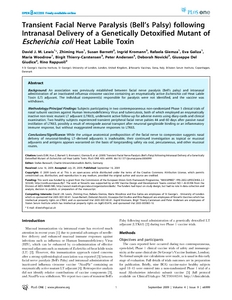Lewis, DJ;
Huo, Z;
Barnett, S;
Kromann, I;
Giemza, R;
Galiza, E;
Woodrow, M;
Thierry-Carstensen, B;
Andersen, P;
Novicki, D;
et al.
Lewis, DJ; Huo, Z; Barnett, S; Kromann, I; Giemza, R; Galiza, E; Woodrow, M; Thierry-Carstensen, B; Andersen, P; Novicki, D; Del Giudice, G; Rappuoli, R
(2009)
Transient Facial Nerve Paralysis (Bell's Palsy) following Intranasal Delivery of a Genetically Detoxified Mutant of Escherichia coli Heat Labile Toxin.
PLOS ONE, 4 (9).
e6999.
ISSN 1932-6203
https://doi.org/10.1371/journal.pone.0006999
SGUL Authors: Lewis, David John Murdoch
![[img]](https://openaccess.sgul.ac.uk/1854/1.hassmallThumbnailVersion/pone.0006999.pdf)  Preview |
|
["document_typename_application/pdf; charset=binary" not defined]
Published Version
Download (203kB)
| Preview
|
Abstract
BACKGROUND: An association was previously established between facial nerve paralysis (Bell's palsy) and intranasal administration of an inactivated influenza virosome vaccine containing an enzymatically active Escherichia coli Heat Labile Toxin (LT) adjuvant. The individual component(s) responsible for paralysis were not identified, and the vaccine was withdrawn.
METHODOLOGY/PRINCIPAL FINDINGS: Subjects participating in two contemporaneous non-randomized Phase 1 clinical trials of nasal subunit vaccines against Human Immunodeficiency Virus and tuberculosis, both of which employed an enzymatically inactive non-toxic mutant LT adjuvant (LTK63), underwent active follow-up for adverse events using diary-cards and clinical examination. Two healthy subjects experienced transient peripheral facial nerve palsies 44 and 60 days after passive nasal instillation of LTK63, possibly a result of retrograde axonal transport after neuronal ganglioside binding or an inflammatory immune response, but without exaggerated immune responses to LTK63.
CONCLUSIONS/SIGNIFICANCE: While the unique anatomical predisposition of the facial nerve to compression suggests nasal delivery of neuronal-binding LT-derived adjuvants is inadvisable, their continued investigation as topical or mucosal adjuvants and antigens appears warranted on the basis of longstanding safety via oral, percutaneous, and other mucosal routes.
| Item Type: |
Article
|
| Additional Information: |
PubMed ID: 19756141
©Lewis et al. This is an open-access article distributed under the terms of the Creative Commons Attribution License, which permits unrestricted use, distribution, and reproduction in any medium, provided the original author and source are credited. |
| Keywords: |
AIDS Vaccines, Adult, Axons, Bacterial Toxins, Bell Palsy, Enterotoxins, Escherichia coli, Escherichia coli Proteins, Female, Gangliosides, Humans, Inflammation, Male, Mutation, Protein Binding, Tuberculosis Vaccines, Vaccines, Inactivated, Science & Technology, Multidisciplinary Sciences, Science & Technology - Other Topics |
| Journal or Publication Title: |
PLOS ONE |
| ISSN: |
1932-6203 |
| Related URLs: |
|
| Web of Science ID: |
WOS:000269970000006 |
| Dates: |
| Date |
Event |
| 2009-09-16 |
Published |
|
  |
Download EPMC Full text (PDF)
|
 |
Download EPMC Full text (HTML)
|
| URI: |
https://openaccess.sgul.ac.uk/id/eprint/1854 |
| Publisher's version: |
https://doi.org/10.1371/journal.pone.0006999 |
Statistics
Item downloaded times since 01 May 2012.
Actions (login required)
 |
Edit Item |



